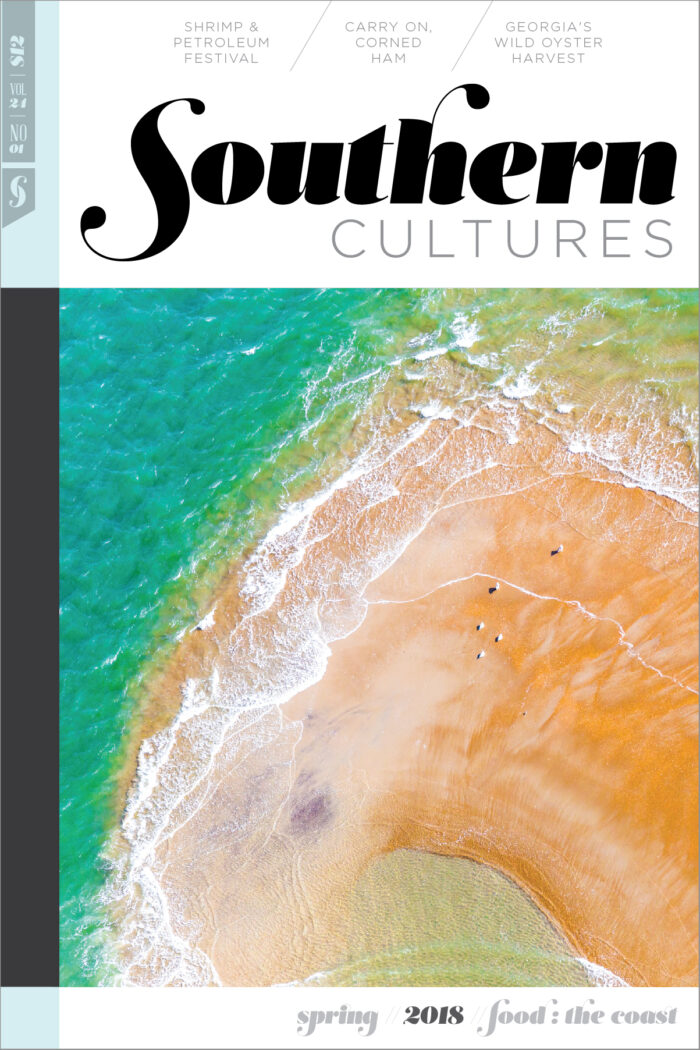Deborah Pratt and her younger sister Clementine Boyd are stabbers. For almost forty years, stabbing has supported them and their families, brought them fame, and taken them around the world. Stabbing is a method of shucking oysters that winds through generations of African American families in the Chesapeake Bay region. It’s done like this: you pin a muddy oyster to the table. It looks like some kind of sea rock, impossible and impenetrable. When you find the lip of the oyster, you gently wiggle in your knife. Then, you stab down at the heart, which really means slicing away the bottom muscle. You flip it over, and you cut the second muscle, freeing the oyster from the shell. Using a rhythm consisting of three beats, stabbing sounds like this: Stab. Cut. Flip. Or—Stab. The. Heart. Or—Boyd’s preferred count—I. Love. You. Pratt and Boyd are known as two of the fastest stabbers in the country, some might even say—and this camp includes Pratt herself—the world.
Stab. Cut. Flip. Or—Stab. The. Heart. Or—I. Love. You.
For shuckers being paid by the gallon in oyster houses, stabbing is very fast and leaves you with perfectly plump, non-wounded meat. For half-shell markets, you get a sturdy oyster soaking in a juicy, rocky cradle. If you don’t crunch as you chew, you know that a stabber’s shucked your oyster.
Boyd taught Pratt how to stab. She learned it from her mother and aunts while working next to them in oyster shucking houses along the Rappahannock River in Eastern Virginia. Pratt still shucks oysters at one of those few remaining houses, Walton Seafood. She shucks at a wet slab of cement next to her son, Davila Redmond. On her other side stands Boyd.
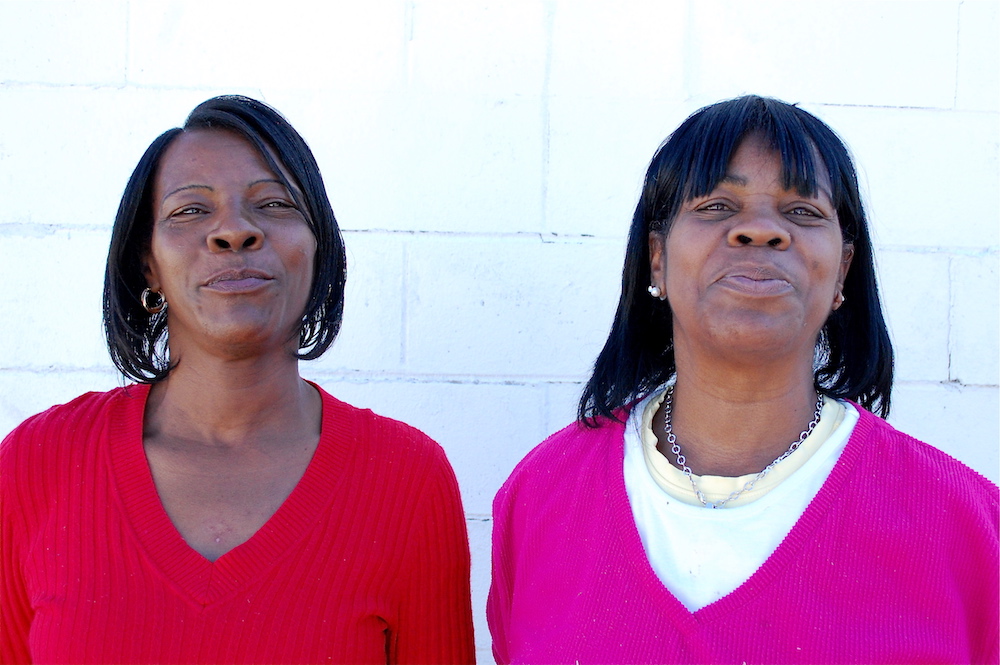
“When I first started shucking oysters,” Boyd says, “I said [to myself], ‘I wonder why these people will be rocking and rocking, shucking and rocking, and shucking and rocking.’ Then all of a sudden it was a movement, just a thing. Some people stand straight still and shuck, shuck, shuck. But we had a thing that we go rocking, Pick up and shuck, pick up and shuck. It gave me a rhythm in my hand, and so that made me get better and faster, better and faster.”1
On a good day, the sisters are known to shuck an oyster in under three seconds. Pratt’s held the U.S. National Oyster Shucking title three times, taking her to the world competition in Galway, Ireland, where she’s taken third place. Boyd’s captured dozens of Virginia state titles, but she’s never been to Ireland.
“Clementine is always on my back,” says Pratt. “‘Cut it clean, cut it clean. Scrape it from the bottom!’ Because I’m very quick about it. But presentation means a whole lot when it comes to this competition. It’s not just how you open an oyster or how fast you are. You must open it so the person can eat it with their eyes.”2
It’s not just how you open an oyster or how fast you are. You must open it so the person can eat it with their eyes.
It’s a damp morning in October 2013 and I am (a white woman in my early thirties) driving Pratt and Boyd—who are chain-smoking Dorals in my 2001 Saturn—to the fairgrounds of the U.S. National Oyster Shucking Competition in southern Maryland. It’s Saturday, a day of preliminary heats determining the six men and six women who will advance to Sunday’s finals. The Sunday competition—one man versus one woman—compete for the American spot in Ireland. Contestants come from all over the country, but mostly the South and the East Coasts. The competition is entwined in a bigger oyster festival that includes carnival rides, a craft fair, and drink tickets.
As we approach the fairgrounds, a young black man points us toward a very muddy parking lot. I follow his arm and begin to turn my car right. Pratt tells me to ignore him and continue driving forward.
“We got a special spot up front,” she says, pointing toward a fence that is chained shut and lined with barricades. The man begins violently whipping his arm across his body. I drive up to him and roll down my window.
“Excuse me, sir!” I say. “I’ve got two oyster shucking champions in the car! Any chance we can park a little closer?”
He shakes his head no. Pratt leans over me. She’s wearing two thick strands of pearls around her neck. As she moves toward my window, the pearls knock into the drink holder, making a hollow sound.
“We got some fast oyster shucking champions in here,” she says. “You telling me they ain’t got better parking for us?”
He shakes his head no. Pratt stares him down. He does not smile; he does not offer alternatives.
“Boy,” Pratt says, still staring at him, “I’ll shoot you.”
She keeps her stare fixed on him as I drive us into pure mud.
We walk to a barn serving as a practice hub for contestants who shuck oysters then sell the half shell to oyster festival crowds.
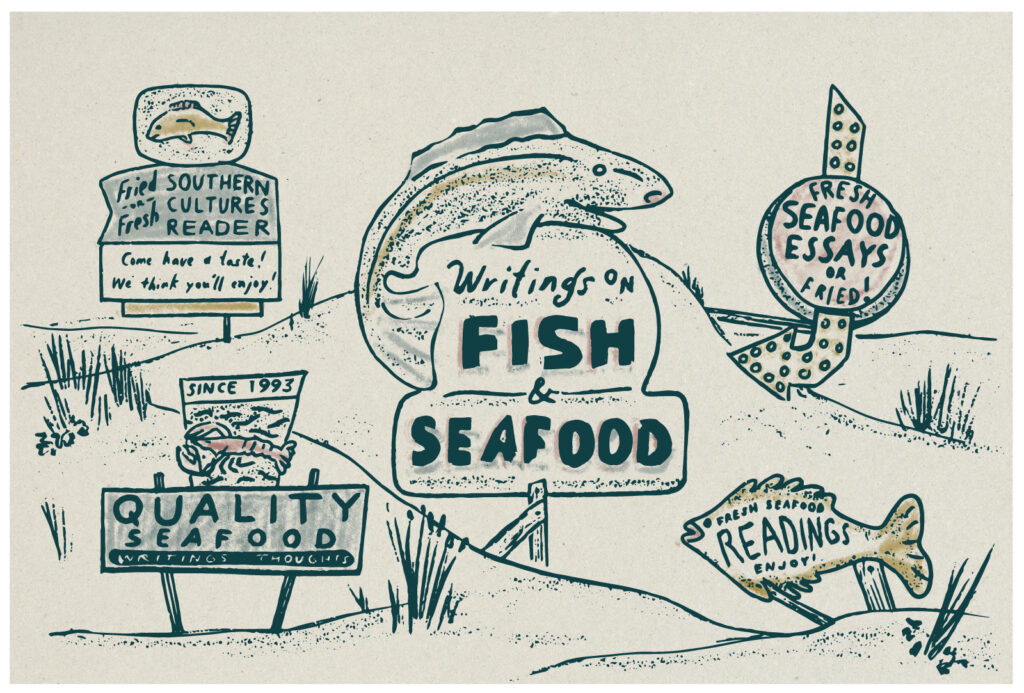
Fresh or Fried: A Southern Cultures Seafood Reader
Twelve fish(ish) tales from the archives (with accompaniments). Read the whole platter here.
Pratt and Boyd cover their hands with large, shiny, black rubber gloves and belly up to a table alongside competitors—all of them white men who own restaurants and raw oyster bars, mostly from towns along the Gulf Coast. These men do not stab, like Pratt and Boyd. They shuck from the oyster’s hinge. Back-door shuckers, as the two sisters call them. One of these men, Scotty O’Lear, from Panama City Beach, Florida, has also been to Ireland. He stands with a cigarette pinched between his lips, a long ponytail down his back. He holds the oyster out in front of his body without using the table for leverage. His tall, blond eighteen-year-old son Devin shucks in the exact same style next to him. There’s Duke Landry from Louisiana, short with arms like Popeye, post-spinach. He owns Landry’s, a seafood chain started by his uncle in the 1930s. He’s also been to Ireland several times, and though he hasn’t won, he’s earned a reputation for his perfect presentation. There’s Rick McCurley, who passes out business cards labeling him “the Aphrodisiacist.” In Florida, McCurley shucks for private clients, mostly bands such as ZZ Top and Nickelback.
Here are the rules for the competition: you shuck twenty-four oysters. When you finish your last oyster, you throw your arms into the air, marking your time.
Here are the rules for the competition: you shuck twenty-four oysters. When you finish your last oyster, you throw your arms into the air, marking your time. Your tray is carried away to a restricted area behind the competition stage where four middle-aged Maryland watermen poke and judge each oyster. “Broken shells?” one man calls out. If so, one second for every broken shell is added to your time. “Blood or dirt?” If found, a three-second penalty. The men jiggle the oysters. If the oysters are still attached to the shell, three seconds. If the meat is wounded, three seconds. For sloppy presentation, two seconds. Missing oysters? Twenty seconds.
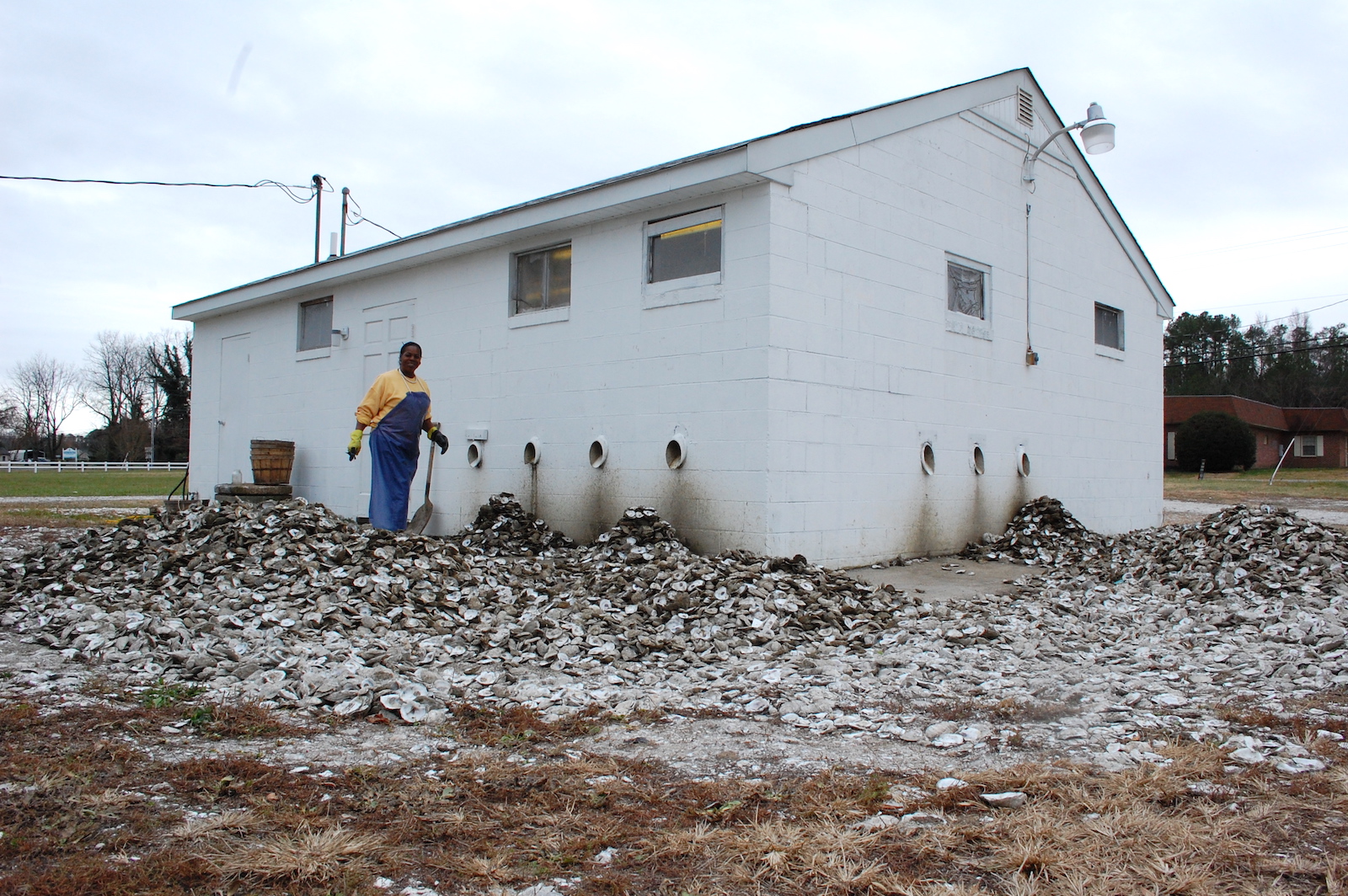
The women’s heat is first, with only five contestants vying for six spots in the women’s finals. Boyd lifts her face to the sky and closes her eyes. Her lips are moving. Pratt closes her eyes and bows her head. A volunteer walks up to Pratt to check on her before he realizes she’s praying. The sisters hug and return to their starting positions. Gloved hands lift into the air, an emcee counts down from five, hands fall from sky to table.
Pratt’s movements are minimal; her feet are firmly planted. Keeping her body still, she only moves her right arm, the knife held surely in her hand. But Boyd moves. She stands light and flexible on her feet, like a basketball player about to let go of a three-pointer. She rocks her body back and forth, repeating I. Love. You., leaning so far into the oyster, almost shielding it from the audience. I wait for Pratt’s hands to go up, but it’s Boyd who throws her left hand in the air first. She turns quickly and walks offstage, wins with a final time of two minutes, fifty-one seconds. Pratt finishes in three minutes, twenty-three seconds. People from the audience come up to congratulate Boyd. She responds with a smile and a Thank you, baby, but she doesn’t say much else. It’s just a heat and she’s proud, so she takes it, holds onto it, but she does not run with it. I silently hope Boyd wins.
‘Thank you, baby,’ but she doesn’t say much else.
The truth is their time at this is limited. The sisters are pushing sixty. Unlike the men who compete alongside them, Pratt and Boyd have spent most of their lives in the fading shucking houses in Eastern Virginia. Their hands are scarred, they have arthritis, and both have bad knees from standing on wet, cold, concrete floors in cheap rain boots for decades. Pratt has had arthroscopic knee surgery. Every time she stands up from a table, it takes her a remarkably long time to get all the way up.
In his book The Big Oyster, Mark Kurlansky writes, “No modern invention has proved as efficient as a good shucker with an oyster knife.” And he’s right; gadgets are incapable of doing something the human hand does better. This is evident now because of the way oysters are grown in this area: delicately in cages in small batches, mostly for the half shell in glossy restaurants. (Neither Pratt nor Boyd eats oysters. Pratt can’t stand the taste, Boyd is allergic. In fact, most oyster shuckers I’ve interviewed do not eat them.) The most prominent of these companies in Eastern Virginia is Rappahannock River Oysters. The shells of farmed oysters are much more fragile (“It’s because the shells are thinner,” Pratt says. “They break easier when they shucked”) than the wild ones being dragged up from Chesapeake rivers and dumped onto tables in front of Pratt and Boyd in burlap bags during the fall and winter seasons.
Gadgets are incapable of doing something the human hand does better.
Shucking has received scant attention because it was seen as an unskilled labor, but when Pratt and Boyd move their bodies and hands into these creatures, they embody a tradition that’s so very far from unskilled. They are trained to shuck large quantities of oyster meat which ends up in pint jars and sold in grocery stores and markets throughout the region. Their incomes depend on the speed and quality of the oyster meat they shuck. They don’t get health insurance or salaries in the shucking house; they are paid by the number of quarts of oyster meat they shuck, in cash at the end of their shift. But they know these modern, farmed oysters just as well. They understand how delicate they are and how people in oyster bars and restaurants, as Pratt says, “know a beautifully shucked oyster when they see one.”3
When I research oyster shucking in Virginia, I find barely enough to fill a thin file. It makes me wonder if the trade went largely ignored by writers and historians because the people who shucked in this region of the South were poor and Black, that these oyster shuckers were not seen to be as valuable as the fisherman with boats and oyster tongs along the Chesapeake. Today in Middlesex County, Virginia, which hugs the Rappahannock River, the number of African Americans shucking in oyster houses is dwindling rapidly, like the houses themselves, down to a handful. The average age is beyond retirement—people in their late sixties and seventies. Most of the houses have closed; the few that still operate employ a couple of Black men and women, but the workforce is primarily Latinx and seasonal.
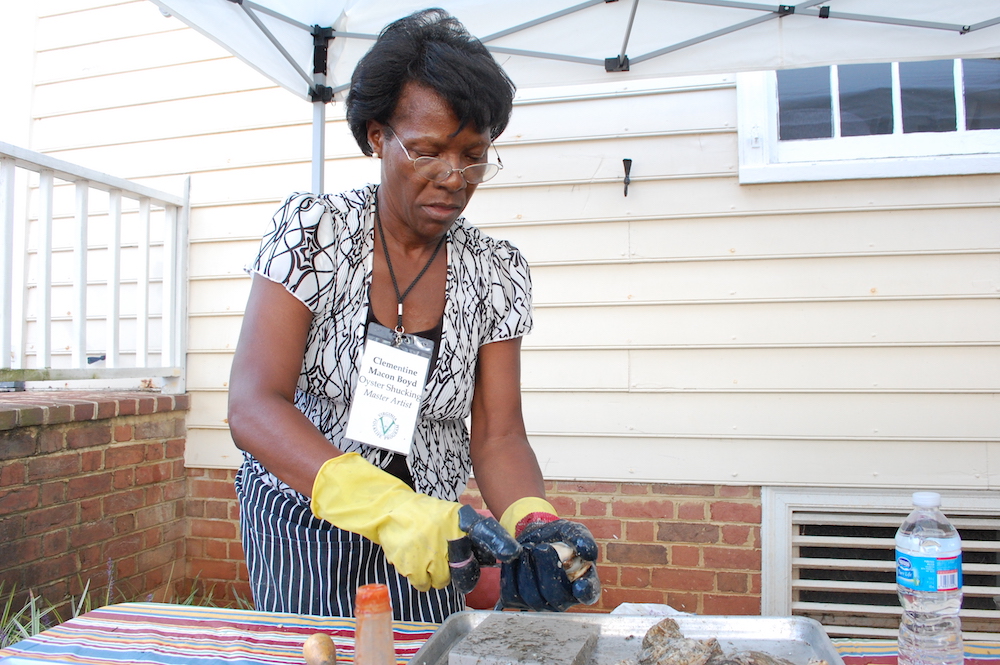
Urbanna, Virginia is a town of almost five hundred people. It’s quiet in the winter and spring months, and bursting at the seams in the summer and fall. It’s an ideal spot for people living inland to buy vacation homes, and it’s a prime tourist destination for people coming from Richmond and Washington, D.C. There’s a phrase here for those who flock to Urbanna: Going to the Rivah. The Urbanna Oyster Festival is the town’s biggest event of the year, bringing in almost fifty thousand people to the little town in one weekend in November. Urbanna is very proud of the festival, not only because it brings in significant revenue but because there’s a deep pride in the history of the water trades here: fishing, crabbing, oystering.
Oyster shucking houses expanded to rural Virginia river towns, beyond major port cities like Baltimore and Norfolk, in the second half of the nineteenth century. Because of its proximity to the river, Urbanna experienced an influx of oyster shucking and packing houses opening their doors. Watermen moved to an all-in-one model: oysters were harvested, bought, and sold on Chesapeake rivers like the Rappahannock, James, and York, and brought back to shore to be shucked and packed. Most of the county seized the opportunities this burgeoning industry brought in its many forms, which improved the quality of life for residents of the county, who were starving and struggling for work after the destruction caused by the Civil War.4
The oyster supply multiplied to historic numbers during the war, creating a high demand for shuckers in turn. During the slavery era, African American men in Middlesex County worked on the river as well as tobacco fields. Following Emancipation, “men from all occupations representing all classes of society eagerly entered business, and soon there were hundreds of oystermen where formerly there had been only a dozen or so.” The Chesapeake Bay waters “provided a more economical level playing field.” Tidewater, Virginia, was experiencing its largest oyster gold rush, and African American men could make their own living off the fishing industry, which provided them with access to their own tools for the trade, like canoes and oyster tongs, and instruments to participate in the crabbing industry. These men had an opportunity to earn their own living on the river, both directly on the water and in the trades that were created from the industry, like canneries and shucking houses on the Rappahannock. As a result, the majority of oyster shuckers in 1880s Middlesex County were African American men. As the industry expanded, more women came into the shucking houses, and by the end of the twentieth century, the numbers had reversed such that African American women predominantly worked the industry. With their earnings from the river and from shucking, African American families bought land and built businesses, churches, and schools in communities such as Water View, where Pratt and Boyd were born and raised.5
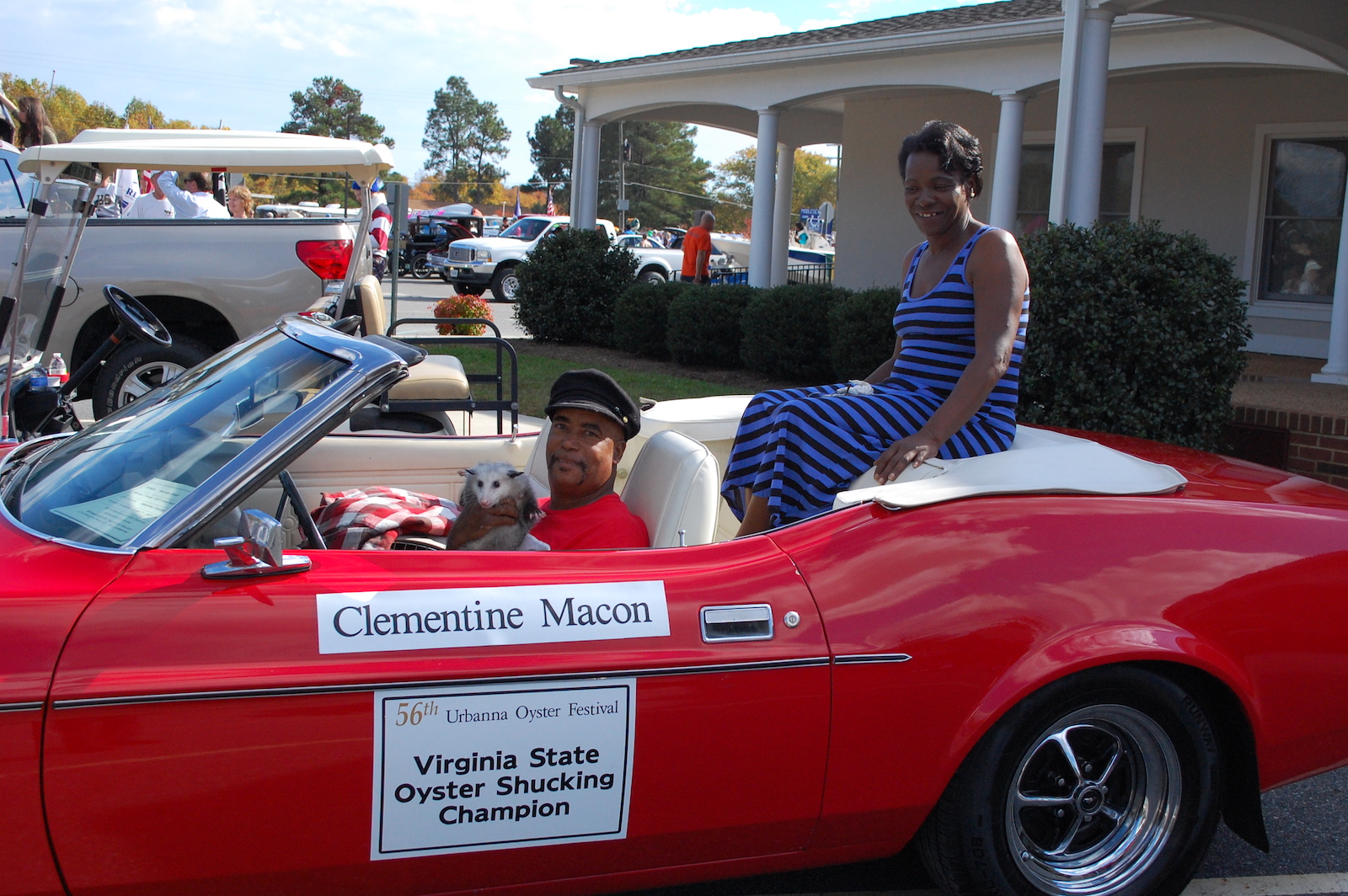
The shucking houses in Urbanna were named after the white men who built them: Norton Oyster House, J. W. Hurley & Son Seafood, Captain D. M. Nelson, Green Bristow & Company, R. A. Davis, George Van Wagenen, T. F. Marshall. There are stories from some of the women who shucked in these houses, like Nell Hodges and Sarah Stokes, both of Urbanna, that to pass the time women joined in and sang hymns together over the sound of oyster shells falling to the floor. There were also races between shuckers to see who could shuck a gallon the fastest. While we cannot confirm that shucking houses were the first sites of oyster shucking competitions, it’s a plausible theory.6
“It was kind of hard,” Boyd says. “We learned from where we came from and never forget where we came from. And that’s what we ourselves as parents instill in our children: don’t ever forget where you come from, and don’t ever let somebody tell you what you cannot do in life, because you can do it. Through God, all things are possible. All things are possible.”7
Many of the sisters’ aunts, uncles, and cousins worked as oyster shuckers in local packing houses. Boyd dropped out of high school and started shucking in the mid 1970s.
“I remember it well,” she says, “because I started going out. I was about eighteen years old and [before] my first date my mom told me, ‘You go out there and get pregnant if you want. You’re gonna take care of it.’ And I said, ‘Oh my god!’ So I went out, and I got pregnant at nineteen years old. That’s when I had my oldest son. So I ended up having to go to learn how to shuck oysters, and I learned from my mother and her brother. And when I first started, I had difficulty learning. Learning how to get in the oyster, and cutting it with the knife . . . You end up nicking and cutting your hand, you still have little nicks and cuts and bruises and stabs in there. I just picked up the pace. And then I got kind of good at doing it. I started getting better and better, and shucking so many gallons a day. And when the oysters are good, you can make at least $100 or $150 a week. If it’s fat and pretty, you get a gallon in fifteen minutes or twenty minutes.”8
Pratt, on the other hand, originally swore off working in the shucking house. “My motto in life was that I would never shuck oysters. That was not my goal; I always said I wanted to go to school and do something else. [My parents] would come home smelling like oyster mud, and I said, ‘Oh no. That’s not for me.’ I left home at the age of eighteen and went to New Jersey. I came back home because I didn’t like the city, and I got married here. And then my husband began to drink a lot, and we’re on our second child. So my sister, she taught me how to open oysters one night on the back of her doorstep.”9
“Don’t ever say what you’ll never do,” Boyd says. “And especially when it’s coming to surviving or supporting yourself or your family. And so she wanted to learn how to shuck, so I showed her how to do it. So we got a bushel of oysters and went out on the back doorstep that night, and I showed her how to get in.”10
“Oysters is piece work,” Pratt says. “If you don’t shuck, you don’t get anything, and nobody going to give you nothing. This is the one thing to keep you in mind to make you a stronger person and make you hard to the world because whatever you make, that’s what you got.”11
Oysters is piece work. If you don’t shuck, you don’t get anything, and nobody going to give you nothing.
For most of their lives, Pratt and Boyd have been the sole breadwinners of their families, working every imaginable hour. Oyster season mirrors the school year, September to (almost) May, and during this time the sisters worked almost literally around the clock.
The shucking competitions became a family function for the sisters, who traveled to Maryland for the U.S. National Oyster Shucking Competition and other East Coast venues with their children and siblings. From these trips, Pratt has accumulated scrapbooks and piles upon piles of newspaper clippings and magazine articles. Shucking competitions became a way for Pratt and Boyd to travel outside of Tidewater, Virginia.
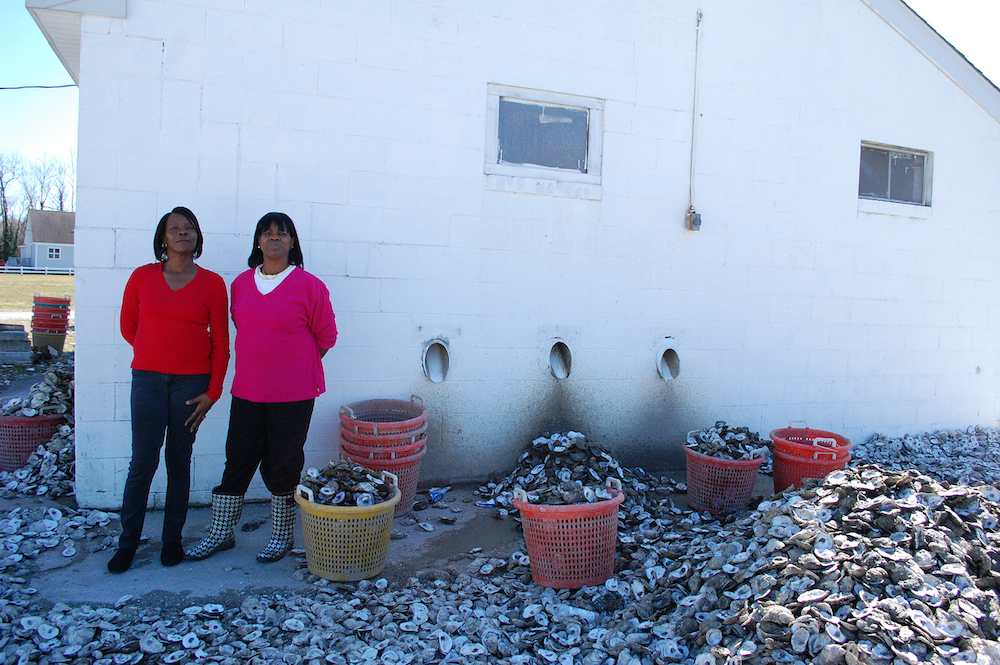
“We’re home girls, we call it,” Boyd says. “We really never left out of town and went anywhere. As far as the impact it had on my life—traveling to Maryland every year, going to West Virginia—before, I had never went to West Virginia. I went to Connecticut with Deborah. I never went to Connecticut. It was exciting. And it was a joy. As far as the oysters, you go to different places, and you get to travel, which we never did when we was coming up as children because we never had that.”12
“I would say that if I never shucked oysters,” Pratt says, “I would have never left out of the State of Virginia, or the United States. Oysters played a great role in my life, and I would tell any child on this earth that twenty-four oysters took me around the world.”13
Those twenty-four oysters also provided the Virginia seafood and tourism industries an opportunity to use Pratt as an icon for the newly emerging aquaculture (oyster farming) industry, to rally the crowds once again for a local oyster that had almost seen the grave.
Anybody can go wherever they want to go. I found oysters took me where I needed to be.
In the 1980s and 1990s, the Virginia oyster was almost decimated. Two parasitic diseases, MSX and Dermo, tore through the Chesapeake Bay, eating away at its oyster population and its industries. Pratt and Boyd, like so many oyster shuckers, were either waiting for Gulf Coast oysters to be transported to Virginia so they could shuck, or they went on unemployment. The sisters started competing in the mid-1980s in the Virginia State Oyster Shucking Competition, headquartered in Urbanna. As Pratt began to get the attention of audiences in the competition, she also appealed to marketers.14
“We try to use her [Pratt] as much as possible because of the popularity, and it helps promote the product,” says Joe Caldwell, former director of the Virginia Marine Products Board (the marketing arm of the Virginia seafood industry). “The popularity of the oyster has increased and being able to tap into Deborah and Clementine is one thing, but to have the story [is another]. And as we use them we can see the reaction of the people that listen to what they have to say. They both have a great story.”15
On permanent display (storage) on Pratt’s kitchen table are archives from these campaigns: magazines with Pratt posing for the Virginia Tourism Board, most famously the “Virginia is for Lovers” advertisement. She’s been painted, quoted endlessly about those twenty-four oysters and about how she never wanted to shuck oysters in the first place. These opportunities give Pratt a spotlight that she loves and absorbs well. They’ve also put her in demand for events and private parties around the region and the country, from governor’s balls to master artisan status at both the Virginia and Richmond Folklife Festivals.
“There’s always a party somewhere and they’ll say ‘We’re looking for that famous woman that opens oysters.’ And when I get to the party, they’ll say, ‘Oh. This is that famous woman?’ Some people are in denial of how fast I shuck oysters. Someone will call me up and say, ‘Well, we need like four people to shuck.’ And I’ll ask for how many people. And they’ll say, “200 to 300.’ And I’ll say, ‘Oh. Excuse me, sir. I think you only need two.”
Because of this demand, Pratt gets to set her fees high and negotiate for things that an oyster house shucker could never dream of asking for.
“Anybody can go wherever they want to go,” says Pratt. “I found oysters took me where I needed to be.”16
This essay first appeared in the Coastal Food issue (vol. 24, no. 1: Spring 2018).
Sara Wood is the project manager for the Southern Oral History Program. Prior to joining SOHP in 2017, Wood traveled the American South collecting stories of the region’s diverse cultures as the oral historian for the Southern Foodways Alliance, based at the University of Mississippi. She’s produced stories for National Public Radio, and sound walks and installations for museums and cultural sites such as the Whitney, the New York Public Library, and the National Park Service. She has an MFA in creative writing from the University of North Carolina Wilmington, and she attended the radio program at The Salt Institute for Documentary Studies in Portland, Maine.
Header image: A poster designed by the Virginia Folklife Program for the Virginia Folklife Festival.
NOTES
- Clementine Boyd, interview by Sara Wood. Audio Oral History for the Southern Foodways Alliance, Jamaica, Virginia, February 2013.
- Deborah Pratt, interview by Sara Wood. Audio Oral History for the Southern Foodways Alliance, Jamaica, Virginia, February 2013.
- Larry Chowning, A Living History of Middlesex County, Virginia (Richmond: Carter Printing Company, 2012), 129.
- Ibid., 129 and 219.
- Ibid., 129, 219, and 182.
- Sarah Stokes, interview by Sara Wood. Audio Oral History for the Southern Foodways Alliance, Urbanna, Virginia, November 7, 2013.
- Clementine Boyd, interview by Sara Wood, February 2013.
- Clementine Boyd, interview by Sara Wood, February 2013.
- Deborah Pratt, interview by Sara Wood, February 2013.
- Clementine Boyd, interview by Sara Wood, February 2013.
- Deborah Pratt, interview by Sara Wood, February 2013.
- Clementine Boyd, interview by Sara Wood, February 2013.
- Deborah Pratt, interview by Sara Wood, February 2013.
- Darryl Fears, “Chesapeake Bay oyster appears to be in recovery mode,” Washington Post, March 4, 2012.
- Joe Caldwell, interview by Sara Wood. Newport News, Virginia, November 2013.
- Deborah Pratt, interview by Sara Wood, February 2013.

